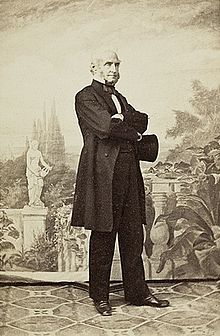Hamilton Rowan Gamble
| Hamilton Rowan Gamble | |
|---|---|
 |
|
| 16th Governor of Missouri | |
|
In office July 31, 1861 – January 31, 1864 |
|
| Lieutenant | Willard Preble Hall |
| Preceded by | Claiborne Fox Jackson |
| Succeeded by | Willard Preble Hall |
| Missouri Secretary of State | |
|
In office 1824–1826 |
|
| Governor |
Frederick Bates Abraham J. Williams |
| Preceded by | William Grymes Pettus |
| Succeeded by | Spencer Darwin Pettis |
| Personal details | |
| Born |
November 29, 1798 Winchester, Virginia |
| Died | January 31, 1864 (aged 65) |
| Resting place | Bellefontaine Cemetery |
| Political party | Republican |
| Profession | Judge, politician |
| Military service | |
| Allegiance |
|
| Service/branch |
|
| Years of service | 1832 1861-1862 |
| Battles/wars |
Black Hawk War American Civil War |
Hamilton Rowan Gamble (November 29, 1798 – January 31, 1864) was an American jurist and politician who served as the Chief Justice of the Missouri Supreme Court at the time of the Dred Scott Decision in 1852, writing a dissenting opinion when his colleagues voted to overturn the 28-year precedent in Missouri of "once free always free". During the American Civil War, he was appointed as the Governor of Missouri by a Constitutional Convention after Union forces captured the state capital at Jefferson City and deposed the elected governor.
Hamilton Gamble was born in Winchester, Virginia, the youngest of seven children of Joseph and Anne Hamilton Gamble, Scots-Irish who immigrated to Virginia in 1784 from northern Ireland. Gamble studied at local schools and at age 13 went to Hampden-Sydney College, a Presbyterian seminary. He read the law with an established firm and by 1817 was accepted to the bar in Virginia. In 1818 as a young man of 20, he moved to St. Louis, Missouri to join his older brother Archibald Gamble, who had moved there earlier and was established as a clerk of the St. Louis Circuit Court.
In 1827, Gamble married Caroline J. Coalter of Columbia, South Carolina. He likely met her when she was visiting St. Louis, as both her brother David Coalter and a sister lived there. Her sister was married to the attorney Edward Bates of St. Louis; he later served as a judge and was appointed as the United States Attorney by President Abraham Lincoln during the Civil War.
...
Wikipedia
